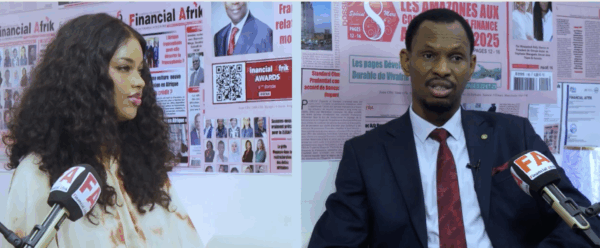After being welcomed triumphantly in Nouakchott on July 11 by a large crowd upon his return from the YES Africa 2025 Summit in Marrakech, Ba Bocar Abdoulaye, Vice President of the Pan-African Youth Union, actively participated in the Fintech Mauritania Hackathon, held from July 17 to 23 at the Fasaq Hotel. The young leader engaged in a question-and-answer session right after a notable opening panel, during which he emphasized the central role of his generation in the political, economic, and digital transition that Africa is undergoing. His motto is unequivocal: “Impossible is not African.”
Interview conducted by Mayo Sow, Nouakchott
In this exclusive interview on the sidelines of the Fintech Mauritania Hackathon, Ba Bocar discusses the challenges facing African youth, the policies needed to unleash their potential, and the urgency of a paradigm shift. “African youth is facing major challenges: massive unemployment, insecurity, clandestine migration, unequal access to education, and a mismatch between training and the job market,” explains Ba Bocar. “These are daily realities. Yet behind these challenges lies immense potential. However, public policies need to enable this youth to act, to undertake, to innovate.” He emphasizes the need to reform training systems to align them with the real needs of African economies, particularly in digital, energy transition, or rural entrepreneurship. “We must train to transform.”
Advocacy for youth entrepreneurship
The Pan-African Youth Union, through its advocacy actions, regularly calls on African heads of state to fully integrate youth into development policies. “We organize forums, such as the Africa Start-up Forum, to connect young entrepreneurs, link them with investors, mentors, and institutions. We no longer want speeches; we want concrete mechanisms to support youth entrepreneurship.” According to Ba Bocar, access to financing remains a major barrier: “There is a need for sovereign funds dedicated to youth, tax incentives, and incubators in every region.” The UPJ is currently developing partnerships to offer practical training, mentoring sessions, and networking opportunities across the continent.
Asked about environmental issues, Ba Bocar responds directly: “Africa produces little greenhouse gas, but it is on the front line of the consequences. Drought hits the Sahel, populations flee, conflicts worsen. It is not just an ecological issue; it is a security issue.”
In July, the UPJ participated in the 11th session of the African Forum on Sustainable Development in Kampala. “We mobilized the presidents of 54 national youth councils. We want our voice to be heard on the international stage. The environment is not a luxury for Africa.”
Digital: a lever for transformation
According to Ba Bocar, digitalization represents a unique opportunity: “A young person from Kiffa or Nouadhibou can now create, innovate, sell, learn, without leaving their city. Digital is a weapon. Properly used, it is a development factor. Misused, it is a social bomb.”
He praises the organization of the Fintech Mauritania Hackathon as an example of what needs to be replicated: “For a week, we saw motivated, brilliant young people creating concrete solutions for their country. They do not want to flee. They want to contribute.”
Including marginalized youth: an imperative
“It is not enough to talk about youth. All youth must be included,” says Ba Bocar. “Young people from rural areas, popular neighborhoods, women, young people with disabilities, or NEETs – not in employment, education, or training – must be at the heart of policies. Otherwise, we are creating a social bomb.”
According to the World Bank, more than 112 million young people in Africa are in this situation. “If we do not train them, if we do not listen to them, if we do not give them a place, they risk falling into delinquency, radicalization, or forced migration.”
Continental recognition
Distinguished in Marrakech at the YES Africa 2025 Summit, Ba Bocar Abdoulaye sees this award as a collective recognition: “This award is not mine. It belongs to all Mauritanian youth. It tells every young person from Fouta, Tagant, or Nouakchott: you are capable.”
He also thanks President Mohamed Ould Cheikh El Ghazouani for the trust placed in him and for the constant support of Mauritanian youth. “It is also the result of a policy that believes in its youth.”
A message of hope and mobilization
In conclusion, Ba Bocar delivers a strong message: “My journey shows that with little, you can do a lot. I went from a simple student to Vice President of the Pan-African Youth Union. I have traveled to over 30 countries, represented Mauritania on all five continents, but my driving force remains Africa.” “Impossible is not African,” he repeats. “Let us be proud of our identity, our languages, our cultures. Let us create, innovate, stay. The future is here.”


